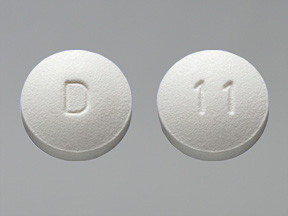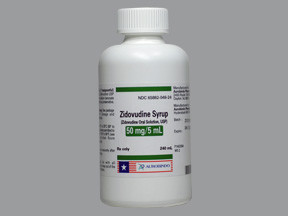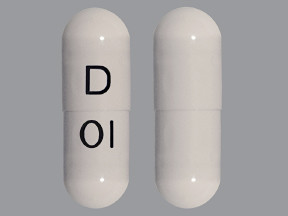ZIDOVUDINE (AZT) - ORAL
PHONETIC PRONUNCIATION: (zye-DOE-vue-deen)
COMMON BRAND NAME(S): Retrovir
GENERIC NAME(S): zidovudine
Uses
USES: This drug is used with other HIV medications to help control HIV infection. It helps to decrease the amount of HIV in your body so your immune system can work better. This lowers your chance of getting HIV complications (such as new infections, cancer) and improves your quality of life. Zidovudine belongs to a class of drugs known as nucleoside reverse transcriptase inhibitors-NRTIs. Zidovudine is used in pregnant women to prevent passing the HIV virus to the unborn baby. This medication is also used in newborns born to mothers infected with HIV to prevent infection in the newborns. Zidovudine is not a cure for HIV infection. To decrease your risk of spreading HIV disease to others, do all of the following: (1) continue to take all HIV medications exactly as prescribed by your doctor, (2) always use an effective barrier method (latex or polyurethane condoms/dental dams) during all sexual activity, and (3) do not share personal items (such as needles/syringes, toothbrushes, and razors) that may have contacted blood or other body fluids. Consult your doctor or pharmacist for more details.
How to use ZIDOVUDINE (AZT) - ORAL
HOW TO USE: Take this medication by mouth, usually 2-3 times daily with or without food or as directed by your doctor. Take this medication by mouth with a full glass of water (8 ounces/240 milliliters) unless your doctor directs you otherwise. If you are using the liquid form of this medication, carefully measure the dose using a special measuring device/spoon. Do not use a household spoon because you may not get the correct dose. Dosage is based on your medical condition and response to treatment. Pregnant women may need to take this medication 5 times a day. Newborns are usually given the liquid form every 6 hours for 6 weeks after birth to prevent infection. Take this medication 2 hours before or after taking clarithromycin. Clarithromycin may prevent your body from fully absorbing zidovudine. For the best effect, take this medication at evenly spaced times. To help you remember, take this medication at the same times every day. It is very important to continue taking this medication (and other HIV medications) exactly as prescribed by your doctor. Do not skip any doses. Refill your medication before you run out. Do not take more or less of this drug than prescribed or stop taking it (or other HIV medicines) even for a short time unless directed to do so by your doctor. Skipping or changing your dose without approval from your doctor may cause the amount of virus to increase, make the infection more difficult to treat (resistant), or worsen side effects.
Side Effects
Precautions
Interactions
Overdose
Images
Reviews
Faq for ZIDOVUDINE (AZT) - ORAL
Zidovudine (AZT) is an antiviral medication used to treat Human Immunodeficiency Virus (HIV) infection. It helps to reduce the risk of complications and slow down the progression of the virus.
Zidovudine (AZT) belongs to a class of drugs called nucleoside reverse transcriptase inhibitors (NRTIs). It works by interfering with the replication process of the HIV virus, inhibiting the reverse transcriptase enzyme and preventing the virus from multiplying.
Common side effects of Zidovudine (AZT) may include nausea, vomiting, headache, fatigue, dizziness, muscle pain, insomnia, and anemia. It is important to report any severe or persistent side effects to your healthcare provider.
Zidovudine (AZT) is available in tablet and capsule forms. It is usually taken every 4-6 hours, depending on the prescribed dosage. It is important to follow the instructions provided by your healthcare provider and take the medication regularly to ensure its effectiveness.
Zidovudine (AZT) cannot cure HIV infection. It is used as part of a combination therapy called antiretroviral therapy (ART) to control the virus and improve the immune system. It helps in reducing the viral load and slowing down disease progression.
Zidovudine (AZT) can be used during pregnancy, as it has been shown to reduce the risk of HIV transmission from mother to baby. It is considered safe and recommended as part of the standard treatment for pregnant women with HIV.
Zidovudine (AZT) may interact with other medications, including other antiviral drugs, antibiotics, and certain medications that affect the immune system. It is important to inform your healthcare provider about all the medications you are currently taking to avoid potential drug interactions.
It is generally recommended to avoid alcohol while taking Zidovudine (AZT) as it may increase the risk of side effects and liver toxicity. It is always best to consult with your healthcare provider for specific recommendations regarding alcohol consumption.
If you miss a dose of Zidovudine (AZT), take it as soon as you remember. However, if it is close to the time for your next scheduled dose, skip the missed dose and continue with your regular dosing schedule. Do not take a double dose to make up for the missed one.
Warning
WARNING: Zidovudine has caused severe blood problems including a decrease in red blood cells (anemia) and white blood cells (neutropenia). They occur more frequently in people with advanced HIV disease (AIDS). Blood problems may require blood transfusions or stopping your medication. Your doctor will order blood tests to monitor for this. Keep all medical appointments. Seek immediate medical attention if you develop signs of anemia (unusual tiredness, breathing problems, weakness, bluish fingernails/lips, pale skin, fast heartbeat). Low white blood cells can make you more likely to get serious (sometimes fatal) infections. Seek immediate medical attention if you develop signs of infection such as fever, chills, persistent cough, breathing problems, or sore throat. This medication may also cause muscle problems (myopathy). Seek immediate medical attention if you develop symptoms of myopathy (such as wasting or decrease in muscle size, muscle weakness/pain/tenderness, weight loss). Rarely, zidovudine has caused a severe (sometimes fatal) liver and blood problem (lactic acidosis). Tell your doctor right away if you develop symptoms of liver problems (persistent nausea, stomach/abdominal pain, dark urine, yellowing eyes/skin) or lactic acidosis (rapid breathing, drowsiness, muscle aches). These serious side effects may occur more often in women and obese patients.
Disclaimer
IMPORTANT: HOW TO USE THIS INFORMATION: This is a summary and does NOT have all possible information about this product. This information does not assure that this product is safe, effective, or appropriate for you. This information is not individual medical advice and does not substitute for the advice of your health care professional. Always ask your health care professional for complete information about this product and your specific health needs.



No Reviews Yet